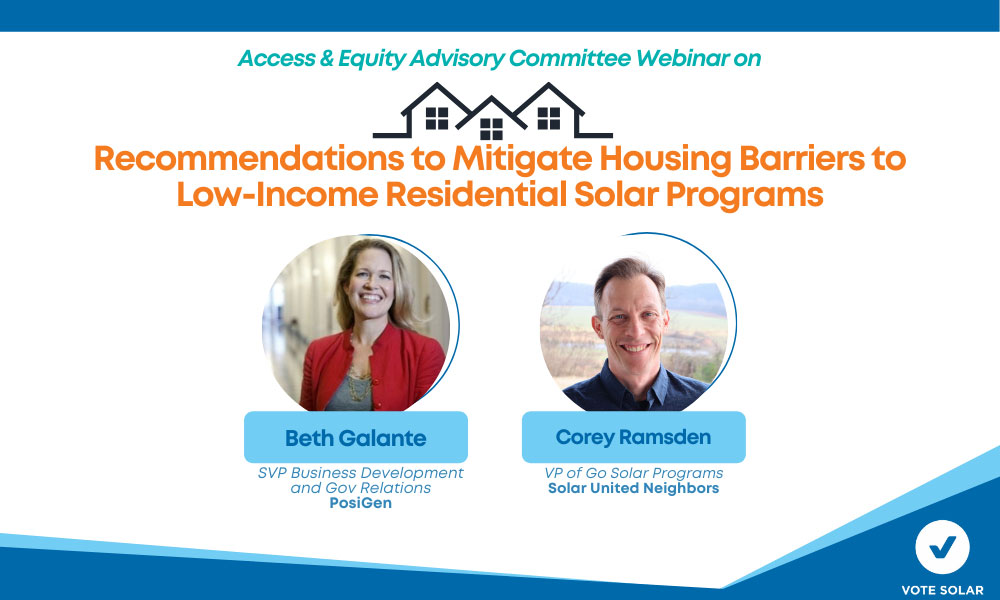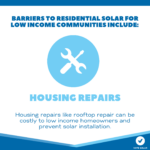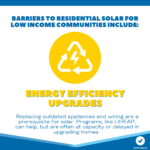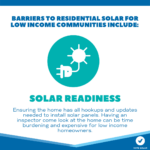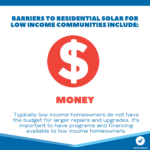Advisory Committee Recommends Policies to Alleviate Low-Income Housing Barriers to Rooftop Solar
Oakland, CA – Today, Vote Solar’s Access & Equity Advisory Committee (AEAC) released a policy brief entitled “Recommendations to Mitigate Housing Barriers to Low-Income Residential Solar Programs.” The brief offers two key recommendations: to coordinate existing resources that can help low-income families go solar, and to increase funding for those programs.
“To create a clean energy future for everyone, policy-makers and solar program administrators need to think about more than just the solar panel,” said Brandy Hyatt, Access & Equity Program Manager at Vote Solar. “Equitable solar programs that work for low-income families must consider financing, home-readiness and other barriers outside of traditional solar services.”
There are a variety of government agencies and service providers that administer programs relating to home health and safety, including energy upgrades like solar. Because of this, the Brief suggests that there may not be a need to develop new programs. Rather, policymakers, program administrators, and service providers should examine the range of services that are offered by their counterparts, and make efforts to coordinate and streamline how those services are deployed.
“Beyond the typical (and valid) need to help low-income residents save money on their energy bills, I feel the obligation to invite low-income residents to participate in a new energy economy. If we don’t extend a hand to help those that would otherwise not be able to participate, who is going to do so?” said Ryan Harry, a member of Vote Solar’s Access & Equity Advisory Committee from Colorado. “Reducing barriers to solar will help more families reap the benefits of clean energy.”
The AEAC also found limited funding across programs that may assist with home repairs, energy assistance, and solar presents a significant barrier for low-income homeowners and program administrators. Low-income programs are notoriously underfunded and many have long waiting lists. In order to increase financial assistance to low-income homeowners for home repairs and solar installation the Brief recommends increased low-income program funding.
“Community Based Organizations have a history of working with white participants, specifically environmental groups who struggle to engage with communities of color or low-income neighborhoods. They can think about 50 years of climate crisis, but give up after 6 months of trying to break into a new community,” said Sherrie Villmark, Program Director with Community Energy Project in Oregon. “Employing these recommendations could help change that.”
Interested in learning more about the brief? Watch our webinar above on “Recommendations to Mitigate Housing Barriers to Low-Income Residential Solar Programs.” Hear from AEAC members Beth Galante, SVP Business Development and Gov Relations with PosiGen and Corey Ramsden VP with Go Solar Programs at Solar United Neighbors.
Across the country, policies and programs to expand solar access and deepen the equitable deployment of solar are being adopted by states and local governments. But in addition to good policies, successful programs require smooth implementation to ensure the benefits of solar reach those for whom they are intended.
Vote Solar’s Access and Equity Advisory Committee was created to address the challenges states, solar providers, customers and other stakeholders are experiencing with implementation of low-income solar programs. The AEAC meets once a year to explore challenges with low-income solar program implementation, identify best practices, and offer solutions to problems.
Read the issue brief:
This year’s Access and Equity Advisory Committee included Zoey Burrows, GRID Alternatives; Ryan Harry; Zaid Ashai, Nexamp; Beth Galante, PosiGen; Sherrie Villmark, Community Energy Project; Corey Ramsden, Solar United Neighbors; and John Delurey, Vote Solar.
Infographics:


